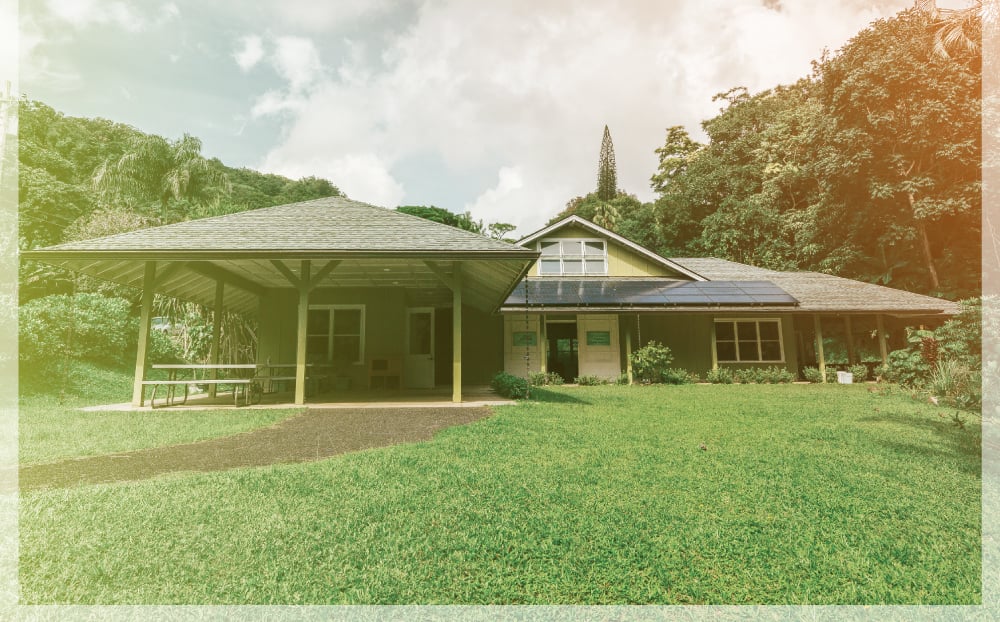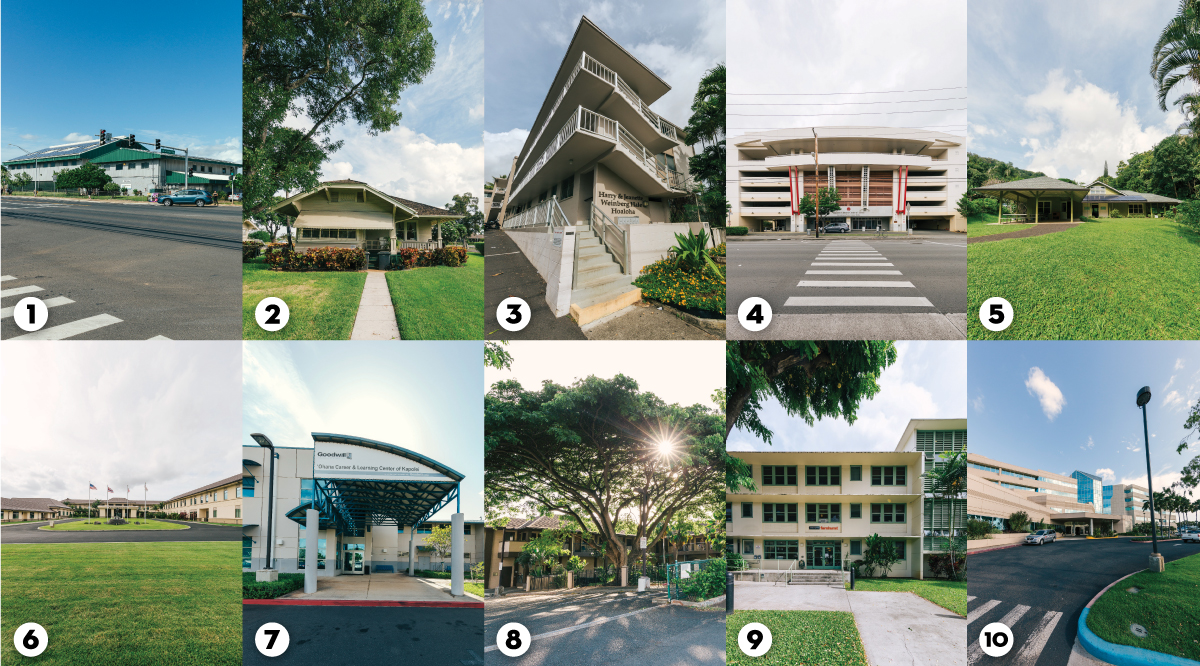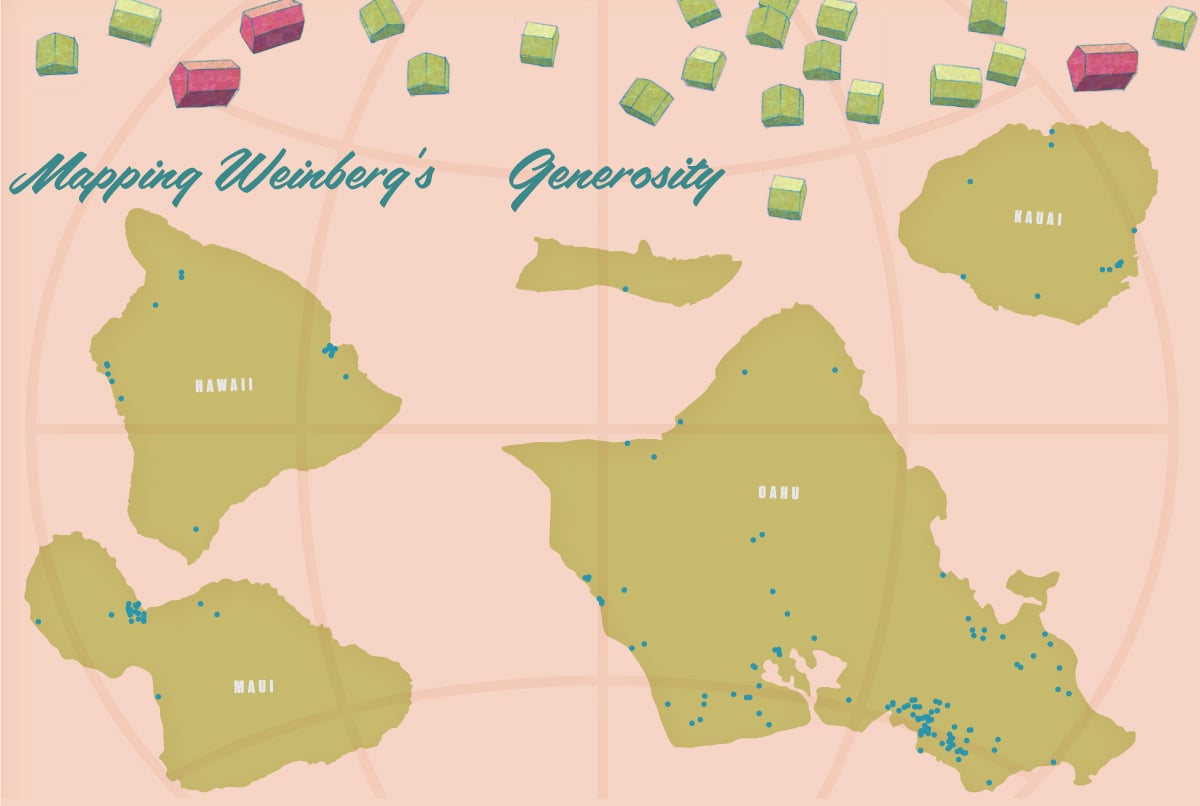Where Did Harry And Jeanette Weinberg Get Their Money From
Harry Weinberg clustered a fortune in local existent manor and was renowned for existence a financially savvy guy, who cajoled and exasperated the summit executives of companies he invested in. However, what most surprised Kit Smith, who covered him for decades as a Honolulu Advertiser business reporter, was his disdain for the trappings of wealth. "By no ways your boilerplate billionaire," Smith says.
Weinberg was a bright guy who came from the streets and didn't have a formal teaching, says Walter Dods, retired CEO and chairman of First Hawaiian Bank. "He always felt he could find a ameliorate way to do things," Dods says. "He was very controversial in his day and a really tough guy. But a lot of the things he said turned out to be correct.

The Hawaii Nature Eye in Makiki is now named for the Weinbergs. Photo by Aaron K. Yoshino.
"I ever tell people the irony is all the society people in Hawaii pretty much disliked him at the fourth dimension and today all of the lodge people in Hawaii who run major charitable organizations continue their hands and knees to the Weinberg Foundation for donations, so it'south kind of similar a full circle. I find it pretty humorous."
Dods recalls when his former boss, so-Showtime Hawaiian CEO John Bellinger, and Bobby Pfeiffer, and then CEO of Alexander & Baldwin Inc., co-chaired a commission in the 1980s to raise money for a new building for Palama Settlement. Dorsum then, Dods says, Weinberg did not give a lot of money to the community. However, Palama Settlement served the poor and that touched Weinberg'south heart.
"They kept pushing and pushing him, and he finally screamed at the two of them, 'I'll tell y'all what. I'll requite a hundred-g dollars,' which in those days was a big gift, and he said, 'And you go around town and you tell everybody else if a Jew can give a hundred-grand dollars, you lot, Amfac, and A&B, and all the major companies improve do meliorate than that.' That was a famous quote at the time that everybody laughed about, only that was kind of Harry Weinberg manner."
Ever AN ENTREPRENEUR
Weinberg was a hard worker and successful entrepreneur from a young age. He and his brothers worked at their father's car repair store in Baltimore, but Harry also sold newspapers, American flags and whatever else he could to make money and provide for his family.
Later, he built a transportation empire and owned bus lines in Honolulu, New York, Dallas and Scranton. What fabricated him successful, according to Corbett Kalama, VP of real manor investments and community affairs for the Harry and Jeanette Weinberg Foundation, was his drive and ability to see value where others lacked plenty patience – especially in the real estate associated with those transportation companies.
Weinberg managed money very tightly, says retired Approximate Art Fong, recalling a time he stayed with Weinberg in Baltimore. "He owned all these places that he had taken over by foreclosure. So, realistically, he was a smart businessman," Fong says.
Fong was working at the Hawaii Public Utilities Commission when Weinberg asked for a fare increase for his bus company, which the PUC opposed. Fong describes Weinberg every bit a fighter who believed in what he did all the fashion, until Mayor Frank Fasi brought in new buses and the city implemented a public double-decker system.
Weinberg also bought stock in large local companies, such as A&B and Dillingham Corp., and positioned himself on the boards so he could point out inefficiencies in the organizations. According to Kalama, Weinberg was able to parlay that into owning land on Maui, Oahu and Kauai: "A lot of the land in that location came equally a result of his involvement and his stock ownership in companies." Today, his foundation owns land in Hawaii valued at $800 million.
Retired Guess Jim Burns says Weinberg was always friendly and courteous with him, merely it seemed that his sole priority in life was to accumulate cash and assets. "My determination was that, to him, it was a Monopoly game he wanted to win," Burns says. "Remembering how many people didn't like him, I smile at what he did with his manor."

Hither are 10 buildings that are named for the Weinbergs or have wings in their names. Clockwise from pinnacle left: 1.) The Boys & Girls Club of Hawaii on Fort Weaver Road in Ewa Beach; 2.) the Easter Seals Hawaii building on Renton Road in Ewa Beach; 3.) Cosmic Charities Housing Development Corp. on Dominis Street in Makiki; iv.) the Japanese Cultural Heart of Hawaii on Beretania Street in Moiliili; v.) the Hawaii Nature Center in Makiki; 6.) the Shriners Infirmary for Children on Punahou Street; 7.) Goodwill Industries of Hawaii on Lauwiliwili Street in Kapolei; viii.) ARC of Hawaii on Waimano Home Road in Pearl City; 9.) YWCA of Oahu on Wilder Street in Makiki; and x.) The Queen's Medical Center-West on Fort Weaver Road in Ewa Beach.
WEINBERG'S LEGACY
Weinberg established his foundation, named after himself and his wife, Jeanette, in 1959. When he died in 1990, his trust was valued at $900 one thousand thousand. Today, the foundation is valued at $two billion and, since 1980, has given nearly $2 billion in grants. "He was a very hardworking visionary who basically had a huge heart," Kalama says. "He was a strong advocate for those who were less fortunate and a model for people to follow. He could very well have but lived a very luxurious life but he lived very frugally considering his mission in life was to work for the poor and needy."
When Smith covered business news for The Honolulu Advertiser, he interviewed Weinberg a fourth dimension or ii in his footing-floor Iwilei function. Smith thinks Weinberg nearly took pride in the identify being and so bare, adding that Weinberg had a gruff exterior and spoke in curt sentences, merely Smith sensed he had a practiced middle. "My goodness, look at all the charities he has supported."
Weinberg'south foundation gives out 5 percent of its value every twelvemonth – well-nigh $100 meg – to nonprofits around the earth. Hawaii receives virtually x percent of that sum – since 1990, more 700 nonprofits in the land have received a total of $315 million.
Reuben Wong, 80, who served as a personal attorney to Weinberg and his Hawaii companies for nineteen years, says this has benefited the people of Hawaii greatly, peculiarly now that many of the big companies – similar Dillingham Corp. and Amfac, that used to donate to charity – don't exist.
His charity is visible in the 183 buildings named afterwards Harry and Jeanette Weinberg in Hawaii. At least 50 pct of the foundation's grants take to exist capital grants – the rest can go toward programs and operating costs. When nonprofits receive capital grants valued at $250,000 or higher, they are required to name their buildings afterward the couple. Kalama says the foundation will then finance upwards to 30 percent of their projects, but the amount cannot exceed $iii meg.
To qualify for a grant from the foundation, nonprofits must take been in functioning for at least three years. They must also provide direct services to depression-income and other vulnerable populations.
The foundation'south focus on the poor and needy stems from Weinberg and his family receiving aid when they were poor, Kalama says. "Ane such situation was when they went to a hospital, the hospital never would accuse them for their services, so 1 of the things that Harry did was brand a $two million contribution to that hospital in Baltimore."
"Had information technology not been for the assistance they received from philanthropic groups, life would have been much more hard. He never forgot that."

This map shows facilities across the Hawaiian Islands funded by the Weinberg Foundation since 1990. A few are no longer there. Also, since facilities are sometimes located near 1 another, a single dot may correspond more than one facility. (click to enlarge)
THE VALUE OF LEGACIES
The Hawaii Community Foundation wants others to see the importance of estates and legacy gifts, similar the 1 Harry Weinberg created with his foundation.
To encourage more such legacy gifts, HCF launched its Hawaii Legacy Giving Campaign last yr, its 100th anniversary. The foundation has been providing nonprofits with tools through workshops, meetings and webinars to help them increase the legacy gifts they receive. Currently, HCF has partnered with more than than 100 organizations.
The primary focus is to assist organizations get over the discomfort they may experience when talking almost legacy giving, considering people tend to chronicle such gifts to expiry, says Curtis Sakai, VP of philanthropy and general counsel at HCF.
Liz Makarra, development manager at the Waikiki Health Center, says the foundation's campaign encourages the centre to create deeper relationships with its donors and to open the door to conversations they wouldn't normally have on a daily basis. "Many of them take been supporting us for many, many years, so that challenge is just getting out of our comfort zone and, for lack of a better word, in a loving and respectful style, encourage them to think nigh leaving a legacy and what that ways. And really that means: Consider us when making your will and in trusts," Makarra says.
Inger Tully, evolution managing director at the Maui Arts and Cultural Center, says the foundation's toolkit, which includes resources such as sample letters, walks the nonprofit through the nuts and bolts of legacy giving. As with the Waikiki Health Center, this campaign has put legacy giving at the forefront of conversations, peculiarly with Maui Arts and Cultural Heart'due south evolution commission and lath, Tully says.
According to HCF'due south Planned Giving Toolkit, nonprofits in Hawaii could receive $six billion if every loftier-cyberspace-worth household left 10 percentage of its estate for clemency. HCF's legacy campaign will go on through 2017, Sakai says.
"Hopefully, what we'll do is get organizations to a place where they develop sort of muscle retentiveness in doing this activity so that, afterwards the campaign is over, they still continue to have a strong legacy giving component in their fundraising."
"IT'S IN THE Deoxyribonucleic acid OF HAWAII"
Hawaii has a strong giving civilization: Almost all households donated cash, appurtenances or time in 2014, with nearly two-thirds giving cash, according to the Hawaii Community Foundation.
"I remember that's only the culture of Hawaii and the spirit of aloha and certainly the role models from the alii to the missionaries and on till today," says Curtis Sakai, the foundation'southward VP of philanthropy and general counsel. "There'due south a great engaged population that cares about each other and takes intendance of the community. I think it's in the Deoxyribonucleic acid of Hawaii."

Source: https://www.hawaiibusiness.com/harry-weinberg-not-your-average-billionaire/
Posted by: cummingsparses.blogspot.com

0 Response to "Where Did Harry And Jeanette Weinberg Get Their Money From"
Post a Comment